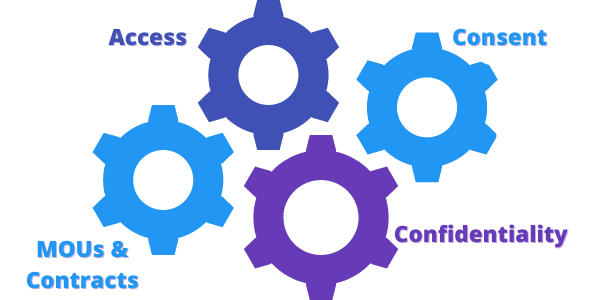Nothing in this section should be interpreted as legal advice for partners and agencies. The resources and information presented here are meant to highlight the legal concerns that are often raised in creating comprehensive school mental health services. Partners are strongly encouraged to engage their own legal counsels early on in the planning and implementation processes.
Contracts and MOUs will help create a structure and legal document to address many of the complex legal challenges to consider in creating these partnerships and services for students.
Some areas to address and consider:
- Develop uniform policies and procedures for referring students to services. How will they enter services? How will they exit? What forms will be used for entrance? What process will be used for exit?
- Ensure data and information sharing within the LEA(s) and with third party providers (this includes both community-based agencies and county behavioral health departments) is understood and in compliance with federal and state law. This includes:
- Determination whether services are governed by HIPAA or FERPA
- What information can and will be shared with who?
- Release of information forms under HIPAA or FERPA
- Consent to treatment forms under HIPAA or FERPA
See Section 5 for more information about Information Sharing between LEAs and other health care providers.
- Discuss issues associated with treatment of minors (and minor consent for services) and develop clear protocols and procedures for such treatment. In California, minors age 12 and over are allowed to consent to their own mental health, substance use and sexual health services. Clinically, it is almost always best to involve family members unless it is detrimental to the students’ well-being. When the services are under the minor’s consent, the health information is protected and, except in cases of potential harm to student or others, is only allowed to be shared with the student. For more information, see Minor consent resources below. Starting January 1, 2024, minors age 12 and over who are enrolled in Medi-Cal will be allowed to consent to their own mental health services. Previously, this right was limited only to emergent circumstances where the minor posed a threat to their own safety or that of others. Minors enrolled in private insurance plans have been afforded this right for well over a decade. This change in law is the result of the passage of Assembly Bill 665 by the State Legislature and the Governor in 2023. While these general practices for obtaining consent for mental health services within local educational agencies are common, they may vary based on specific regional laws, district policies, or individual circumstances. As such, consulting with the legal counsel or the general counsel within the local educational agency is highly advisable before making any definitive decisions or assumptions regarding the consent process for mental health services. These legal professionals are equipped to provide accurate guidance tailored to the specific requirements and legal considerations of the particular educational institution or jurisdiction. Their insights can ensure compliance with all relevant laws and regulations while safeguarding the rights and well-being of the students involved.
Local educational agencies (LEAs) usually obtain consent for mental health services in alignment with established regulations and best practices, especially when dealing with students. Here’s a summary of how and when they typically go about this process:- Parental/Guardian Consent: Before providing mental health services to students, LEAs commonly require parental or guardian consent. This involves informing parents or legal guardians about the nature of the services, their benefits, and any potential risks involved. Consent forms are typically distributed, outlining the specifics of the services and requiring a signature to proceed.
- Emergency Situations: In cases where there’s an immediate threat to a student’s safety or well-being, LEAs may bypass the need for parental consent to provide urgent mental health services. This is usually done to address crises and prevent harm, but it still aligns with policies that prioritize student welfare.
- Train all staff in the continuum of care, including obligations and entitlements under the IDEA, ADA, Section 504 of the Rehabilitation Act, Child Find, and Medi-Cal EPSDT so children are referred for entitlements that they may qualify for. How will special education interface with the rest of the system to ensure eligibility and entitlements are provided and protected?
Relatedly, once a student is referred to services, consider issues around access to those services. What happens if a coordination team cannot come to consensus on the responsible agency for services? How are roles between partners defined and how is the obligation to provide services determined between partners and responsible agencies?
Anatomy of an MOU (National Center for School Mental Health)
A template illustrating components of an MOU that school-community partnerships may include (See Section 5 for sample MOUs)
Minor Consent (California School-Based Health Alliance)
An overview of the laws and resources around minor consent laws for school-based health providers.
Commonly Overlooked School Behavioral Health Contract Terms and Protocols (Atkinson, Andelson, Loya, Ruud and Romo)
Commonly overlooked MOU terms for school-based mental health partnerships
A California Guide for Sharing Student Health and Education Information (California School-Based Health Alliance)
An online guide that provides an overview of the laws that relate to sharing student/patient information (HIPAA, FERPA and California State Law), as well as best practices and resource materials for schools and health providers
Information Sharing and Confidentiality Protection in School-Based Health Centers: A Resource Guide to HIPAA and FERPA (National School-Based Health Alliance)
Broad overview of the privacy rules under HIPAA and FERPA












